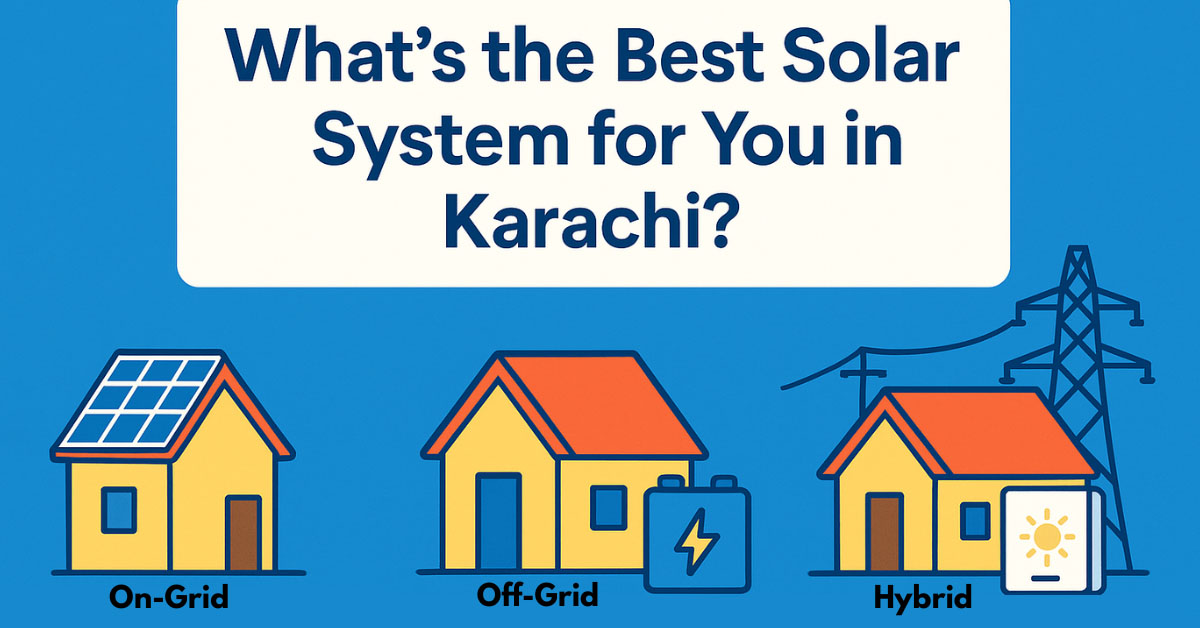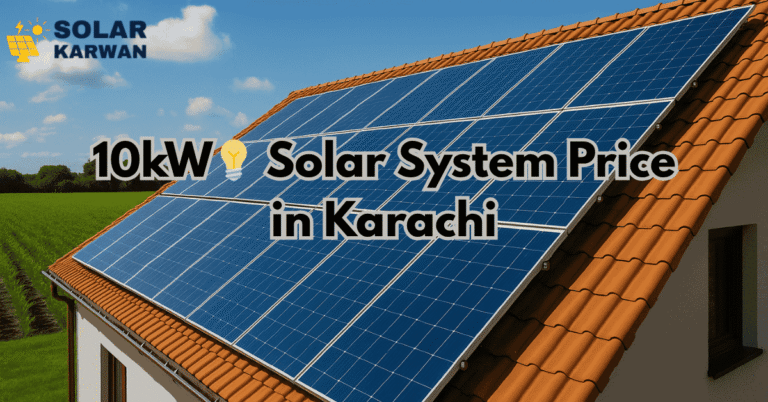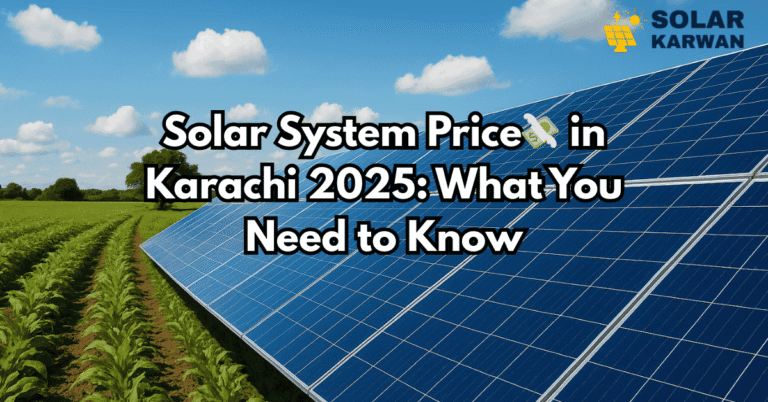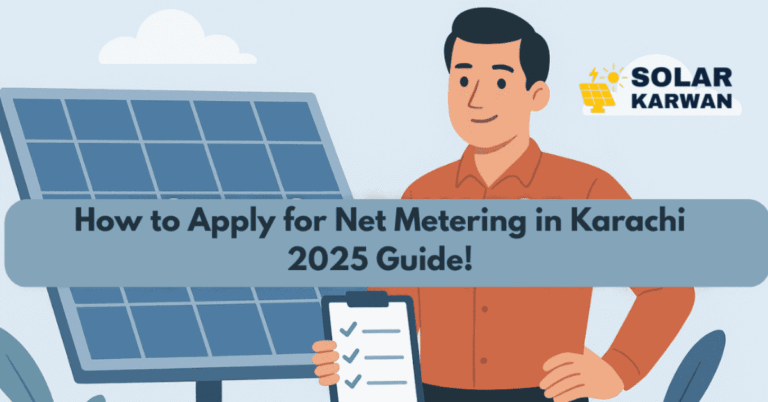If you’re planning to install a solar system in Karachi, one of the first choices you’ll need to make is the type of system you want. Each system works differently, has its unique benefits, and suits different needs.
Chances are, you’ve come across terms like on-grid, off-grid, and hybrid. However, understanding what they mean and how they compare can feel confusing at first.
Are you still confused abour Solar and don’t know a lot about it but, want to?
Read: Karachi Solar Guide: Prices, Setup, Types & Net Metering Explained
That’s why, in this article, we’ll clarify the three main types of solar systems in simple terms.
You’ll learn how each system works, who it’s best for, and the benefits or trade-offs you can expect.
0n-Grid Solar System

An on-grid system connects your solar panels directly to the electricity grid in Karachi.
During the day, your panels generate power. If you use less than you produce, the extra electricity goes to the grid through net metering.
However, at night or on cloudy days, you draw electricity back from the grid.
Let’s look at who this system suits best.
BEST FOR:
- Homeowners and businesses with stable grid access
- Anyone who wants to reduce electricity bills with minimal fuss
Let’s examine the pros and cons.
PROs:
- Costs less upfront (no batteries)
- Let’s you earn credits when you produce extra power
- Keeps installation and maintenance simple
CONs:
- Doesn’t work during grid outages (for safety, it shuts off)
- Offers no backup during blackouts
Want to know how much you can save with solar?
On-Grid Solar System — Estimated Cost & Components
Below is a quick snapshot of typical on‑grid solar system costs in Karachi. This layout shows estimated prices for different system sizes.
(These figures are based on recent market values in Pakistan)
| System Size | Estimate Price (PKR) | Panels Required | Batteries Required | Inverter Required |
|---|---|---|---|---|
| 3kW | 300,000 – 450,000 | YES | NO | YES |
| 5kW | 650,000 – 850,000 | YES | NO | YES |
| 10kW | 1,050,000 – 1,400,000 | YES | NO | YES |
An on-grid system is ideal if you want lower upfront costs and access to net metering benefits.
However, keep in mind it won’t provide power during grid outages unless you add a backup option.
Off-Grid Solar System

An off-grid system is completely independent from K-Electric.
Your panels charge batteries during sunny hours. Your home or facility draws from those batteries day or night.
Let’s look at who this system suits best.
BEST FOR:
- Areas in Karachi with unreliable or no grid supply
- People who want total energy independence
Let’s examine the pros and cons.
PROs:
- Works during grid outages or non‑existent grid connections
- Eliminates or significantly reduces electricity bills
- Gives full energy independence
CONs:
- Off-grid systems can have a higher upfront cost due to the need for batteries and other components.
- Batteries require maintenance and replacement over time
- The size of the system (number of panels, battery capacity) needs to be carefully designed to meet the specific energy needs of the location.
Do you want to know if you are ready for solar?
Read: 5 Signs You’re Ready to Install a Solar System at Home in Karachi
Off-Grid Solar System — Estimated Cost & Components
Here’s a clearer perspective on off-grid systems. Notice how the pricing heavily incorporates batteries.
These setups are more costly but provide complete independence from the grid.
(These figures are based on recent market values in Pakistan)
| System Size | Estimated Price (PKR) | Panels Required | Batteries Required | Inverter Required |
|---|---|---|---|---|
| 3kW | 600,000 – 800,000 | YES | YES | YES |
| 5kW | 1,100,000 – 1,400,000 | YES | YES | YES |
| 10kW | 1,600,000 – 2,000,000 | YES | YES | YES |
Off-grid systems offer complete energy independence, making them ideal for areas with limited or no access to the grid.
Although, if you want both backup power and the ability to benefit from net metering, a hybrid system could be the better fit.
Hybrid Solar System

A hybrid system combines the benefits of both on-grid and off-grid systems. It’s connected to the grid but also has batteries for backup.
During the day, solar power is used to charge batteries, and if the batteries are full, any excess electricity is sent to the grid.
At night, you use battery power first; however, if needed, you can switch to grid power.
Let’s look at who this system suits best.
BEST FOR:
- Homes that want savings plus backup power during load shedding
- Businesses can also benefit from the reliability and cost savings offered by hybrid solar systems
- People who want flexibility in how they use solar energy
Let’s examine the pros and cons.
PROs:
- Works during grid outages
- Can earn credits via net metering
- Reduces dependence on the grid
- Reduces Reliance on the grid, hybrid systems can lower electricity bills
CONs:
- Higher upfront cost than on-grid
- More complex installation and maintenance
Want to know how to install Solar at Home?
Hybrid Solar System — Estimated Cost & Components
👇Below is a table showing the estimated cost of hybrid solar systems in Karachi
(Prices vary based on panel brand, inverter type, and mounting structure quality)
| System Size | Estimated Price (PKR) | Panels Required | Batteries Required | Inverter Required |
|---|---|---|---|---|
| 3 kW | 450,000 – 650,000 | YES | YES (small) | YES |
| 5 kW | 900,000 – 1,200,000 | YES | YES (medium) | YES |
| 10 kW | 1,300,000 – 1,800,000 | YES | YES (large) | YES |
💡 Hybrid setups give you both grid connection and backup power but cost more due to battery and advanced inverter requirements.
Final Thoughts: Which System Should You Go For?

Deciding between on-grid, off-grid, and hybrid systems depends on your energy needs, location, and budget.
Each option has its distinct advantages, so understanding their differences will help you make a wise investment.
👇Below is a side-by-side comparison to make your decision easier:
| Feature | On-Grid System | Off-Grid System | Hybrid System |
|---|---|---|---|
| Connected to Grid | ✅ Yes | ❌ No | ✅ Yes |
| Battery Backup | ❌ No | ✅ Yes | ✅ Yes |
| Works During Outage | ❌ No | ✅ Yes | ✅ Yes |
| Net Metering Option | ✅ Yes | ❌ No | ✅ Yes |
| Upfront Cost | Low | Highest | Medium–High |
| Best For | Lower bills with grid access | Total independence | Savings + backup power |
Still Confused😥?

No matter which solar system you choose, the key is matching it to your lifestyle and energy goals.
Do you still belive in silly solar myths like ”Solar is only for the rich”? Then👇
If you’re still confused, then we are here to help you. Contact Solar Karwan today to get a tailored recommendation.
You can also 📞 Call us at +92-324-2214498 or WhatsApp us for a free consultation!
FAQs

We’ve answered some of the most common queries about solar systems in Karachi below.
If you don’t see your question here, you can chat with Solar Karwan on WhatsApp.
1) How long does it take to install a solar system in Karachi?
Most residential installations take 3–5 days once all materials are ready. Larger systems or complex rooftops may take longer.
The process includes site inspection, mounting structure installation, wiring, and system testing. (Read our Home Solar Setup Karachi: Easy Step-by-Step Guide.)
2) Will my solar system work during load shedding?
- On-grid: No, it shuts off for safety during outages.
- Off-grid: Yes, it works from battery storage.
- Hybrid: Yes, it can run from batteries and still connect to the grid.
If you want both savings and backup during outages, a hybrid system is the best choice.
3) Can I upgrade my solar system later?
Yes, you can expand most systems by adding more panels or batteries. However, your inverter size should allow for future expansion.
Our team at Solar Karwan can assess your setup and guide you on the most cost-effective upgrade path.
4) How much maintenance does a solar system need?
Very little. In Karachi’s climate, most systems only need panel cleaning once or twice a month to remove dust and bird droppings. Check your inverter screen regularly for error messages.
Read Our Guide: How to Maintain Your Solar Panels in Karachi
5) What size solar system do I need for my home or business?
It depends on your electricity usage, rooftop space, and budget.
For example, a 5 kW system often works well for medium-sized homes, while a 10 kW system suits large houses or small businesses.
Get a free custom calculation by chatting with us on👉 WhatsApp.
6) Can solar systems help lower my K-Electric bill to zero?
Yes, with the right system size and net metering approval, you can offset 100% of your electricity usage.
In some months, you may even have credits left over.
However, this requires proper sizing and installation.





